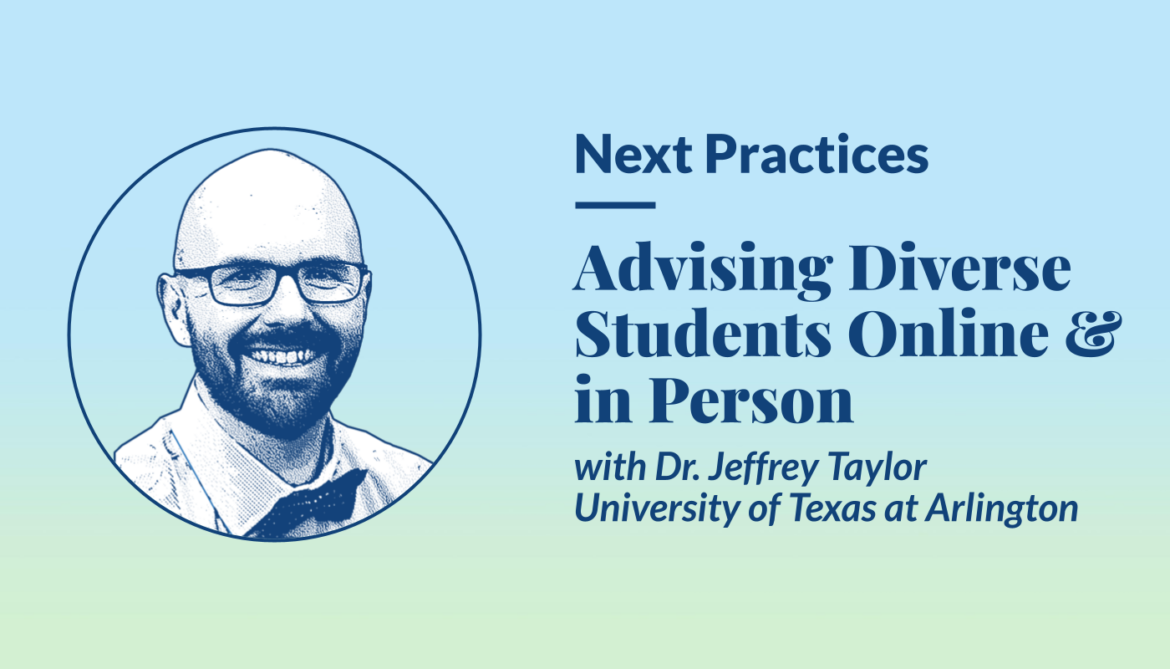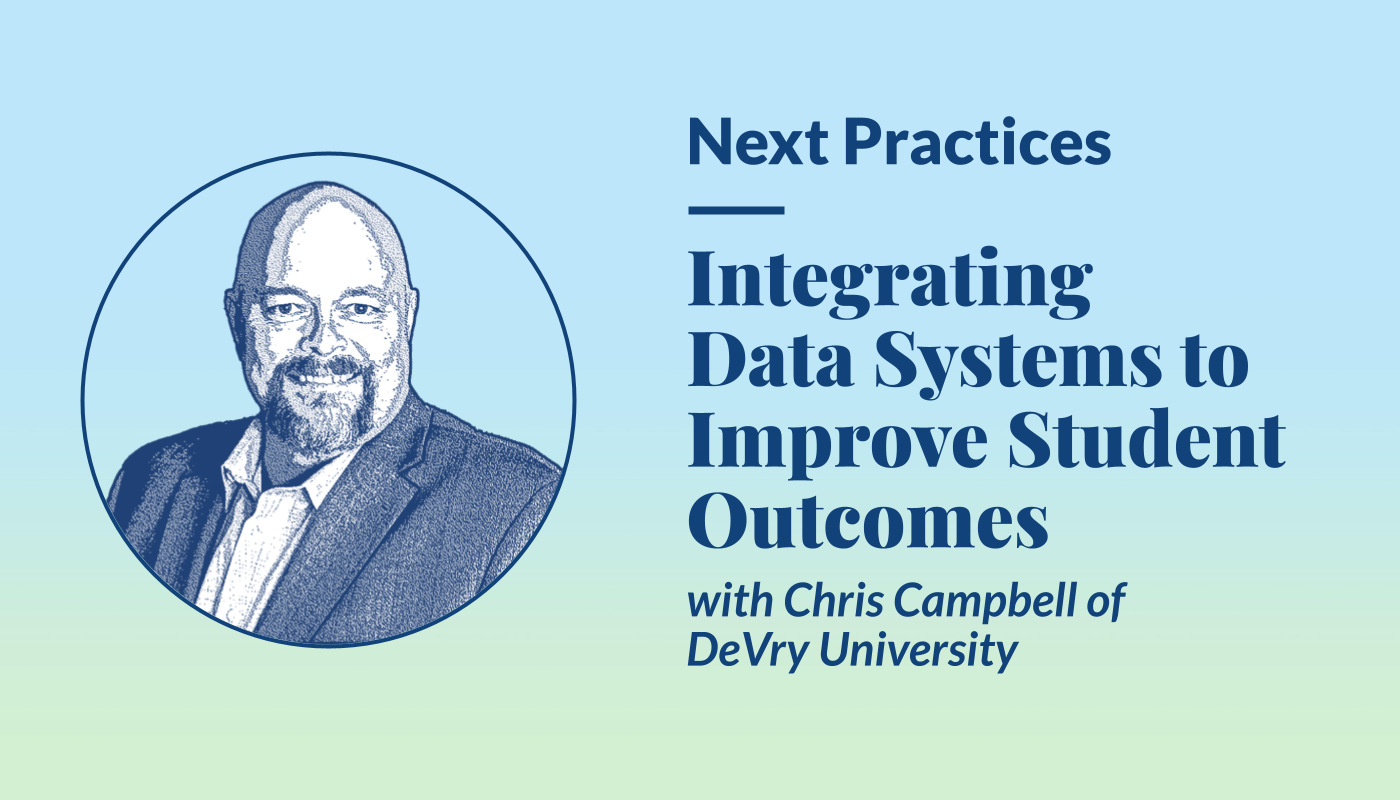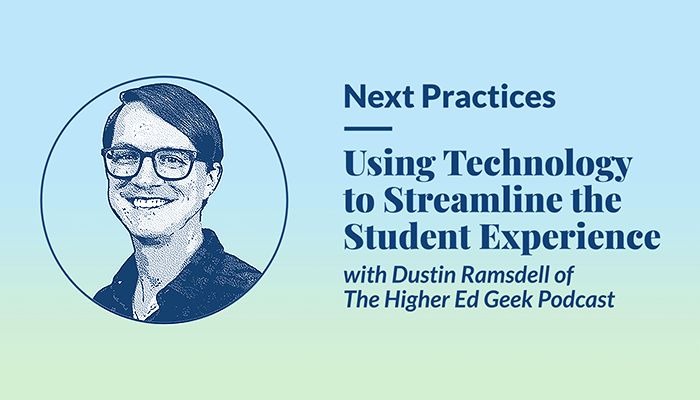
Advising Diverse Students Online and in Person with Dr. Jeffrey Taylor
Share this Post
Subscribe: Spotify | Apple Podcasts | Youtube Music | Full Transcript
With the massive shift to online degree programs in recent years, earning a credential has become more feasible for many students. While colleges and universities are optimistic about the future of online learning, certain challenges remain. One such challenge is how advising departments can effectively support their students in a digital environment. At the University of Texas at Arlington, advisors are succeeding in this effort through relationship building and proactive advising.
Today, I am joined by Dr. Jeffrey Taylor, Director of Academic Advising at the College of Nursing and Health Innovation at UT Arlington. We discuss how the university is meeting the unique needs of its diverse online student population and how its commitment to student success is shaping student outcomes.
Relational advising
For public universities like UT Arlington, standing out amidst a sea of for-profit nursing schools comes down to relational advising. In a time when online students struggle to connect with their advisors, professors, and peers, establishing relationships early on in the admissions process is key in helping them persist and succeed. Dr. Taylor recalls the I-E-O (input-environment-outcome) model in higher education, and stresses the importance of creating an approachable environment for all students to drive positive student outcomes.
Proactive onboarding
Advisors at UT Arlington have found that many of their students’ questions and challenges that pop up throughout the year can be prevented during orientation. This is the time to foster connectedness with students and set the foundation for ongoing support. As part of this effort, the school has implemented daily online orientation sessions to help answer students’ questions in a timely, efficient manner. Unsurprisingly, their analytics confirm that persistence increased among students who attended those sessions.
Hybrid advising model
It’s easy to see the benefits of case management advising, but for many institutions, an exclusive case management system isn’t ideal. When an advisor is out of the office, their caseload builds up, and they’re left with a mass of emails to respond to upon their return. To mitigate this burden, UT Arlington adopts a hybrid approach to their advising. While the bulk of their advising process is centered around proactive case management, they still allow teams to access each other’s caseloads if needed. This ensures students still receive prompt communication even if their advisor is absent and prevents advisor burnout as well.
Meeting student expectations
Each student will have their own preferences on how much they engage with advisors. While some expect thorough, ongoing support, others prefer independence. At UT Arlington, their approach is centered around respecting student preferences–which can mean taking a step back if requested. However, Dr. Taylor stresses the importance of an advisor’s responsibility to assess whether students are truly succeeding in their independence or if they’re struggling to self-advocate.
Asking the right questions
For students who aren’t self-advocating, it’s important for advisors to pose questions that can help students uncover the source of their challenges. For instance, if a student requests to drop a class with no explanation after the drop deadline has passed, advisors should consider discussing that request with the student in order to identify any personal or academic barriers at play. Uncovering the root cause of requests like these can open up new opportunities for support and ultimately help students persist.
Countering time poverty with technology
Time poverty is a significant problem for both students and staff. Many of UT Arlington’s students are working nurses who might struggle to complete their courses with optimal grades. Being proactive with grade evaluation is key to getting students to succeed in their courses and finish their degrees on time. To do this, UT Arlington utilizes various technology platforms, including their Civitas Learning Student Impact Platform, to deliver grade reports each semester. Advisors can easily access these reports and work with students to assess any obstacles, both inside and outside the classroom, that could inhibit their grades.
Flexible technology solutions
Technology systems that work for one department may not work for another, and likewise for students. That’s why UT Arlington aims to be flexible with the solutions they apply to different teams and student groups. Their process involves finding a combination of technology systems that staff can customize to fit their needs. As these needs evolve over time, staff can periodically assess how their systems are performing in the current context and make necessary adjustments. While it’s easy to become attached to the current systems in place, institutions that remain flexible and choose systems that align with their evolving needs will be better positioned to effectively help students and staff.
Listen to the full conversation on Next Practices to learn more about UT Arlington’s student success efforts, particularly for online students.



